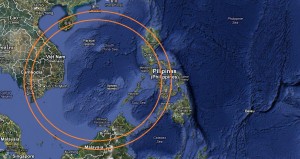Nationalism stokes disputes over islands around Asia

In recent weeks, these long-simmering tensions have returned to a boil, with violent protests in Chinese cities, a provocative island junket by South Korea’s lame-duck president, and Japan’s government reportedly planning to buy disputed islands from their private owners.
The popular analysis is that the rising tensions are fueled by a regional power shift that has seen China become increasingly assertive with its neighbors in securing claims over potentially resource-rich waters to its south and east. But the growing acrimony may have at least as much to do with domestic political posturing.
“Wrapping yourself up in the national flag gives a very convenient exit for people with other agendas to justify their positions,” said political scientist Koichi Nakano of Tokyo’s Sophia University.
Nationalism has often been used by China’s communist leaders to cover up domestic problems—such as the economic slowdown the country is now facing, not to mention problems with a growing rich-poor divide and official corruption.
The same could be said, to an extent, in Japan and South Korea, where some politicians seem to be using the island disputes to further their agendas ahead of elections or to divert attention from thornier topics.
Article continues after this advertisementFew believe the diverse Asian actors in this rapidly developing drama will actually come to blows, but manipulation of popular opinion among island disputants like China, South Korea and the Philippines is raising the chances of violence by either accident or miscalculation. Such an outcome would seriously threaten the fragile peace that has helped catapult tens of millions of Asians from poverty to prosperity.
Article continues after this advertisementThe disputed islands were on the agenda this week as US Secretary of State Hillary Rodham Clinton traveled across the region.
Meeting on Monday with Indonesian President Susilo Bambang Yudhoyono, she urged members of the 10-nation Association of Southeast Asian Nations (Asean) to present a united front to China in dealing with territorial disputes in the West Philippine Sea. She also discussed the issue with Chinese leaders during meetings in Beijing this week.
Preferred access to potentially lucrative oil and gas reserves and rich fishing grounds is helping to drive the disputes, along with an increasingly prosperous and militarily strong China that is beginning to challenge America’s historic supremacy as a Pacific power.
“There is a big power shift in this region and that is encouraging the parties involved to make their case in order not to lose their ground,” said security specialist Narushige Michishita of Japan’s National Graduate Institute for Policy Studies.
But the nationalist card is also front and center as governments jockey for position.
“Nationalism is playing a very large role in all of these disputes,” said international relations specialist George Tsai of Taipei’s Chinese Culture University. “Whether it’s China, Japan, Taiwan, the Philippines or Korea, all these countries are appealing to nationalist sentiments.”
Right-wing politicians in Japan are using the issue to drum up nationalist support, and even mainstream politicians within the ruling party seem willing to let the issue grab headlines from issues like a tax hike and energy policy reforms that are being demanded after last year’s nuclear disaster, Nakano said.
Similar motives can be seen in outgoing South Korean President Lee Myung-bak’s visit to an island claimed by Seoul and Tokyo as he seeks to boost his legacy on what could become a key issue in his party’s bid to maintain power in what will be a toughly fought election.
Last month, lame-duck Lee became the first Korean president to set foot on Dokdo Island, which is called Takeshima by Japan. Korea and Japan have a bitter history—marked by decades of harsh Japanese colonial rule on the Korean Peninsula. Thumbing one’s nose at Tokyo has long had substantial cachet for millions of Koreans.
“I’m skeptical that this has anything to do with international relations,” Nakano said. “It has more to do with domestic politics because internationally it doesn’t make any sense.”
For comprehensive coverage, in-depth analysis, visit our special page for West Philippine Sea updates. Stay informed with articles, videos, and expert opinions.